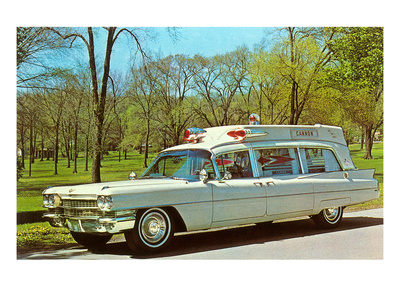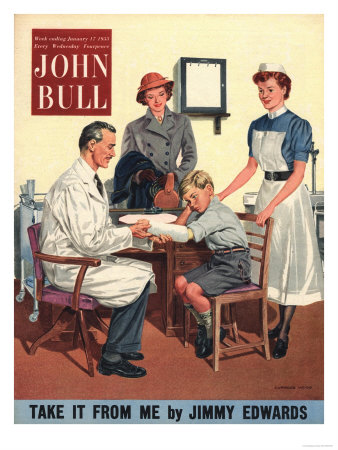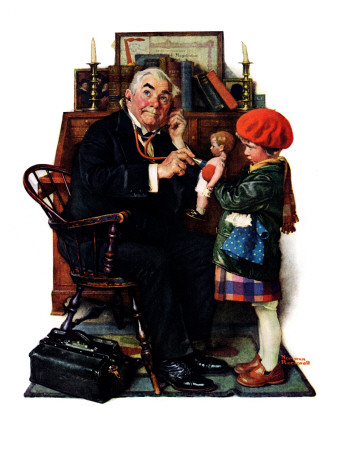Why should we avoid going to the emergency room? Emergency rooms are filled with seriously ill and injured people. They have blood, bacteria, overworked doctors and nurses, and a limited amount of beds. The emergency room needs to be available for true emergencies, such as car accident victims, people who fell off a bridge, people who broke a bone, etc. By going to the emergency room (ER) every time you ‘feel’ ill or hurt a little, you prevent someone with a true emergency from getting proper treatment. Plus, because the ER is there for emergencies, the nurses and doctors are required to put emergency patients ahead of non-emergency patients. That means if you are considered to be a non-emergency patient, you could wait for hours in the ER waiting room before they see you.

Should you go to the emergency room? Or should you wait for the physician's office to open?
by cherylone
Is it an emergency, or is it something that can wait? Here are a few helpful tips and ideas on what to do in an emergency situation.
I don't know about you, but when I don't feel good, or I bump my toe and it turns black, I wonder...
Is it an emergency?
Do I need an ambulance? Should I seek medical attention? Should I go to the ER? Or should I make an appointment with my doctor? Should I ignore it and see if it goes away? The answers to these questions are not easy. Generally, if the injury doesn’t seem to be life threatening, then you should wait until you can make an appointment with your physician during regular operating hours.
Not only does this help the ER which is almost always full, but it also helps your wallet since ER visits are extremely expensive and most insurances won’t cover them unless it is deemed an actual emergency.
If you are not sure about the best course of action....
The best thing you can do is to contact a nurse hot line and speak to them about the situation. They can often give you advice on what to do to handle the situation. They might also be able to give you a few first aid tricks that could keep you from having to go to the doctor. If you don’t have a nurse hot line available to you, you could contact the ER and ask them. They aren’t always willing to give you advice, but they can put you in touch with a nurse or physician’s hot line that can. Also, if your physician’s office is still open, call them.
They can advise you as to what course you should take. Please take note here: most physicians’ offices keep on-call hours. That means that if you are unsure of a medical situation, you can call and speak to the physician that is on call. They will generally be able to tell you the best thing for you to do.
Here is a good rule of thmb for medical situations, if you are unsure of what steps to take.....
Please be aware that I am not a physician and cannot make qualified decisions on required medical care.
This list is nothing more than common sense rules, gleaned from my years as a mother and grandmother; however, you are always the best qualified person for such decisions. And a nurse or doctor would be the first source you should contact if you are not sure.
If a patient is choking or bleeding.....
If a patient is choking, has been hit by a car, has fallen down a cliff, or has fallen off of a high bridge, etc. you should probably call 911 immediately. These types of situations are usually time sensitive, meaning the faster help arrives the better the chances are for survival.
If a patient is bleeding and you cannot stop or slow the flow of blood, it is probably a good idea to call an ambulance and/or seek medical attention at the ER depending on the area that is bleeding. Head, hands, and feet will generally bleed much more than other areas of the body because they have more capillaries located there. Generally if the sides of a wound are puckered, then the wound is deep enough to require stitches.
Lost consciousness, bad burn, or high fever....
If a patient has lost consciousness, it is usually a good idea to seek medical help via ambulance if possible.
If a patient has been burned, bad and not so bad burns. If the burn is deep or covers more than a 1/2 dollar sized area of the body, or is badly blistered, then a doctor’s visit is usually the norm; use burn ointment, cover the area with a sterile bandage and call your physician’s office. An ER is usually reserved for a person who is burned over a large portion of their body or whose burns, though small, are bleeding, or if the burn is by a chemical that is still burning.
If a patient is running a high fever (over 100) it is usually a good idea to seek medical attention, however unless the temperature is above 103, you can call your physician’s office and get a sick visit appointment rather than going to the ER. Physicians keep several appointments open each day for just such situations.
Unresponsive, broken bone, head injury, or disorientation.....
If a patient’s eyes are dilated and non-responsive (meaning that the pupils are very wide and don’t close when you shine a light at them) it is a good idea to seek medical attention.
If a patient has an obvious broken bone (ie the limb is badly distorted or the bone is sticking out through the skin) it is an excellent idea to get the patient to the ER. However, be aware of the fact that the ER cannot cast a broken toe and will most likely tape it to the other toe which you can do at home and then call your doctor to have it checked.
If a patient has hit their head very hard they should probably go to the emergency room.
If a patient is disorientated or seems to be confused as to where they are or who they are, especially if they have just had an accident of some type, they should go to the ER.
Sick child?
If a patient is a child and they have a cold, sore throat, rash, or cough, you should try not to bring them to the ER unless your physician has advised it. Usually such situations can be handled (and are preferred to be handled) at the physician’s office.
Internal injuries or issues...
Internal injuries are very difficult to diagnose which makes it hard to know if you should go to the ER or if a visit to your doctor is enough. For such situations, the following is the general rule of thumb--if there is a high fever, if the pain is a definite 10, if there is numbness in some part of the body (ie the arm, the face, the side), if there is suddenly blurred or lost vision, if there is excessive vomiting (or if they are vomiting blood), if the patient hasn’t had anything to drink or eat for several days, if the patient is passing blood through their urine or feces, if the patient has obvious swelling of some part of the body (ie their stomach is distended), if there is any possibility of the patient ingesting some foreign item (poison, metal, chemicals, etc.), if the patient has known allergies to something and has been exposed (ie they are allergic to bees and they get stung), if the patient is having trouble speaking-breathing-moving-swallowing-answering questions-etc. then they should go to the ER immediately.
These suggestions are not meant to be the 'be all', and 'do all', of emergency situations.
However, I do hope it helps...
It is easier to have a few things listed and know they mean ER than to sit for hours and hours wondering if you should or shouldn’t call for an ambulance. Take a moment to check the person out before you panic. Children especially are very resilient and a fall that would seriously injure an adult, might only give bruises and a few scratches to a child. Also, if the injury or illness is not, or does not seem to be life threatening, try to hold off until the next day and get an appointment with your physician.
Of course, if the injury occurred over a weekend, the hospital may be your only hope depending on how bad the injury seems to be. When an emergency occurs, use your common sense. Ask questions, look for the obvious signs of injury, and ask about pain. If you are not sure, then it usually isn’t an emergency situation. However, if you are still worried, then the ER is the place you should be. Remember to use common sense and ask if you are unsure.
You might also like
Anosmia - Can it be reversed ?Anosmia- loss of the sense of smell is one of the first signs of Parkinson's ...
Tudor remedies and cosmeticsYesterday I visited a Medieval Hall for a Tudor medicine and cosmetics talk. ...














 Fruit and vegetable juice or whole fruits and vegetables, which is better for youon 04/23/2013
Fruit and vegetable juice or whole fruits and vegetables, which is better for youon 04/23/2013
 How to use memory wire to create jewelryon 12/19/2012
How to use memory wire to create jewelryon 12/19/2012
 The Spriteon 11/27/2012
The Spriteon 11/27/2012
 How to keep your feline companions safe and content during the holiday seasonon 11/10/2012
How to keep your feline companions safe and content during the holiday seasonon 11/10/2012


Comments
Thank you, katiem2, I faced this situation time and time again, so I thought it might be nice to share with others. Thank you for stopping by and commenting.
A very good question I've faced myself a time or two. This is a great helpful page we all need to tack up on the side of the fridge as a reminder.